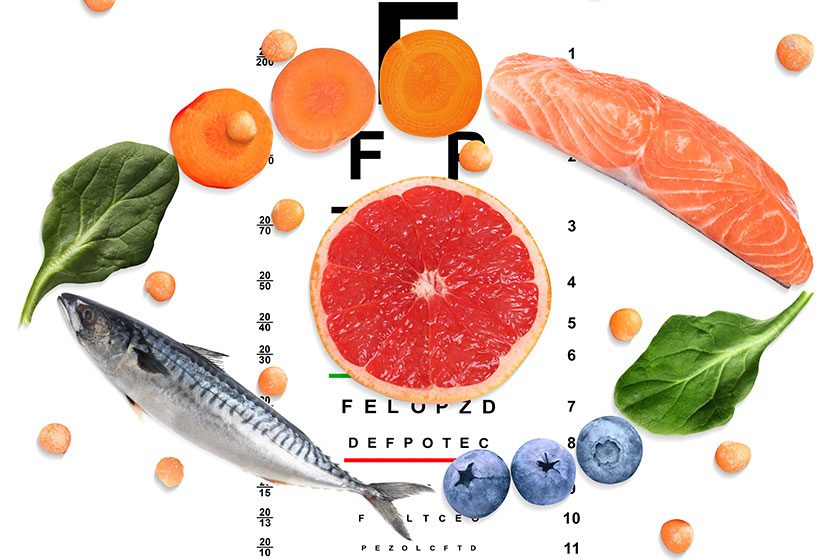Maintaining good vision becomes more important as we age. Diet plays a significant role in supporting seniors’ eye health and preventing common conditions like cataracts and macular degeneration. With the right nutrition, your loved ones can enjoy better vision and a higher quality of life as they grow older.
The Role of Vitamins in Supporting Eye Health
A diet rich in vitamins and minerals can help prevent or delay the onset of common eye diseases. Vitamin A, for example, is vital in maintaining good night vision, which can become a concern as your loved ones age. Found in foods like sweet potatoes, carrots, and leafy greens, vitamin A supports the retina and overall eye function. According to a research published in the National Eye Institute, vitamin A helps the eyes adjust to low light conditions and reduces the risk of certain vision problems.
Lutein and zeaxanthin are carotenoids that protect the retina from harmful light and oxidative damage. These antioxidants, which can be found in foods like spinach, kale, and corn, link to a reduced risk of macular degeneration, a leading cause of blindness in older adults. As cited in a study by The American Academy of Ophthalmology, these nutrients have been shown to preserve central vision and maintain overall eye health.
The Importance of Omega-3 Fatty Acids
Omega-3 fatty acids are another important nutrient for maintaining eye health in older adults. These healthy fats, commonly found in fatty fish like salmon, mackerel, and sardines, help support the retina and prevent dry eyes. Omega-3s can reduce the symptoms of dry eye syndrome, which becomes more common with age. Omega-3 supplementation has also been linked to a lower risk of diabetic retinopathy, a condition that can lead to vision loss in individuals with diabetes.
These fatty acids are integral for maintaining the structural integrity of the retina. Research suggests that omega-3s help protect the eyes from oxidative stress and may lower the risk of age-related macular degeneration, a major threat to the vision of older adults. The American Heart Association highlights the broader health benefits of omega-3s, including their positive impact on eye health.
Antioxidants and Their Impact on Cataract Formation
Vitamin C helps protect the eyes from damage caused by free radicals, which can lead to cataracts and macular degeneration. Citrus fruits, bell peppers, and broccoli are excellent sources of vitamin C, and adding these to your loved one’s meals can help support healthy vision. According to the American Optometric Association, vitamin C has been shown to slow the progression of cataracts, which can cloud vision and impair daily activities for older adults.
Vitamin E, another antioxidant, works in tandem with vitamin C to protect the eyes from oxidative stress. Nuts, seeds, and vegetable oils are rich in vitamin E, and regular intake of these foods can further reduce the risk of cataracts. A study published in the Archives of Ophthalmology found that antioxidants like vitamins C and E may help delay the development of cataracts, making them valuable additions to any diet focused on preserving eye health.
A Balanced Diet for Optimal Eye Health
To protect your older loved one’s eye health, it is important to emphasize a diet that incorporates a wide range of vitamins, minerals, and antioxidants. A balanced diet filled with colorful fruits, vegetables, healthy fats, and lean proteins can support not only the eyes but overall well-being. The American Academy of Ophthalmology recommends a diet rich in vitamins C and E, lutein, zeaxanthin, omega-3 fatty acids, and zinc to help fight common age-related eye problems.
Using whole foods rather than supplements may offer a broader range of nutrients, further supporting eye health. The benefits of a nutritious diet are not limited to just vision; they also help to improve general health, boosting energy levels and reducing the risk of other age-related conditions.
Avoiding Foods That Can Harm Eye Health
While adding beneficial nutrients to your loved one’s diet is important, it is equally important to limit or avoid foods that can harm eye health. Diets high in sugar and processed foods can increase the risk of diabetic retinopathy, a condition that can result in blindness. The World Health Organization recommends limiting processed sugars to help manage blood sugar levels and prevent the development of diabetes-related eye issues.
Reducing the intake of unhealthy fats, sodium, and highly processed snacks will also benefit your loved one’s eye health. Emphasizing whole, unprocessed foods can help protect against oxidative damage and preserve vision over time.
Promoting Healthy Vision through Nutrition
A well-balanced diet, together with lifestyle changes, helps maintain healthy eyes and also supports overall health, making your older family members feel better, more active, and independent. By focusing on a variety of nutritious foods, you can help protect their vision for years to come, allowing them to enjoy clearer sight well into their later years.







